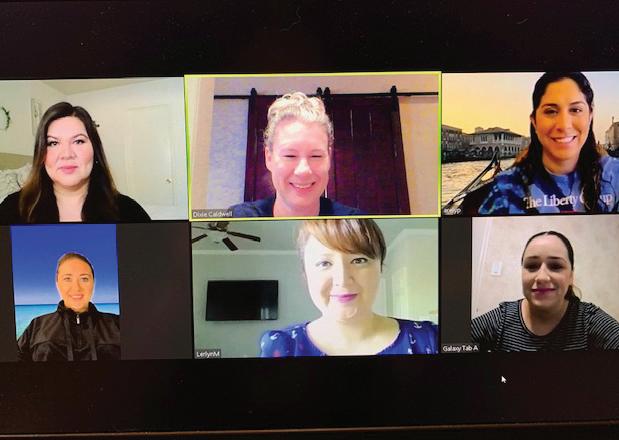
6 minute read
How to Lead During a Pandemic
from ABODE May 2020
Sensible advice during a chaotic time. By ROMMEL ANACAN, The Relationship Difference
A note from the editor: This article was written on March 13. It was edited on March 27. The COVID-19 situation in Houston as it relates to housing providers and the health and safety of residents may have changed. I f you are going to work in this COVID-19 fueled temporary new normal, I wanted to share some thoughts with you on how to effectively manage yourself, your team (if you're in a leadership position) and your residents during this crisis.
Fear, for many people, is driving the bus right now. Fear of getting the virus. Fear of gathering together. Fear of losing income. Fear of not being able to pay rent. Fear of not being able to find childcare while their kids are home and they’re still going to work. Fear of going to the bathroom only to find there is no toilet paper. And yes, the fear of dying.
So, if you're dealing with fear from your residents and/or from your team here are some tips:
Don't Minimize, Empathize
This pandemic has affected many people in many different ways. For some, their lives haven’t changed much. They’re still going to work and no one they know has contracted the virus. While others may have worked from home for some time or are still working from home. Other, may have either been or still are on furlough or terminated completely. Therefore, we each one of us is dealing with this crisis in many different ways.
I’m not a doctor, a lawyer nor a city official, but I can offer you guidance on how to manage people through a crisis. First, do not minimize your team’s fears.
Avoid statements such as: • It's not that big of a deal. • You shouldn't feel afraid.
• You're blowing this way out of proportion.
Rather, you want to empathize with people's fears with simple statements such as: • I can see why you're concerned. • It is crazy isn't it? • I'm worried about all of the things going on, too.
Providing empathy to people simply means giving them permission to feel their feelings and to have their own experiences. When people feel they have permission from you they feel safer and will trust you more. This is what you want to build a foundation of safety and trust, especially in these chaotic times.
NOTE: This does not mean that you have to agree with them. You can think someone is being dramatic or fearful, and you certainly have the right to your own opinions! The key principle here is the importance of separating what you may feel personally from what is prudent professionally.
Don't Add Fuel
At the same time, you don't want to be adding unnecessary fuel to the fire. When people around you are afraid, they need a calming, steady voice in the midst of the storm. So, before you share rumor or unverified information, double check that it's true. Don't criticize people who feel different than you. Don't purchase 1,000 rolls of toilet paper if you don't need to! (Yes, this toilet paper thing has got me riled up!)
So, even as you're empathizing with someone's fears, you may need to avoid adding anything to their already extensive fearsespecially if it's unverified and/or irrelevant to the situation.
My friend, if your internal world is chaotic and uncertain, I get it. Mine is, too. I've taken some financial hits because of this crisis and my wife and I are trying to figure some things out. I have to manage myself and my emotions through this situation, too. The point here is, you can make such a positive and powerful impact by not adding more fuel to an already raging fire. no control over. When fear and worry start to crowd back in, pause and think about what can control. In the areas where you do have control, take reasonable and prudent action. (NOTE: This section wasn’t included in the original version of this article. Of course, many things have changed in the days since I originally wrote this. This section was updated on Thursday, March 26.)
This is an unprecedented time and things are changing almost every day. As of Thursday, March 26, Houston is under a Stay Home, Work Safe Order. Housing providers and supplier partners are considered essential employees, so many in the apartment industry are still going to work every day. Some, those who are able, I would imagine are working from home. As the situation evolves, we must resolve to change with it.
If you are continuing to go to work, maintain six feet of distance between your coworkers or employees. If you are working from home, make sure to get dressed for “the office” and set a schedule for yourself each day. It would be difficult to plan each week in a time when each day brings new challenges and limitations, so my suggestion is to take your to-do list day by day. By the time you read this article, the world, may and hopefully, go back to normal.
Perhaps you'll want to determine NOW what to do if: • A resident can't pay rent due to financial problems brought on by this emergency. • A resident has or is suspected of having COVID-19. • A team member is exhibiting symptoms of COVID-19. • A team member is concerned about their own health and well-being. • The unexpected happens. • And: How you will professionally and effectively communicate your actions and responses to all of the different aspects of this situation to your residents and team members?
The key principle is this: Surrender what you don't have control over. Let it go. Don't waste any time on what you don't have control over. By doing this, you'll have more time, energy and effort to do the things you can do. I'm a praying person, so in this time I am praying for the courage to change the things I can change and the ability to accept what I can't change and the wisdom to know the difference.
From a leadership perspective, keeping people focused on what they can control helps to reduce fear and build safety and trust.
Lastly, I want to say this: • Be patient and understanding with everyone. • Offer empathy and compassion (even when you feel differently). • Show and offer more grace to others than normal. • SMILE. • Don't allow someone else's fears to become your fears. • Create your crisis action plan. • Be flexible. • Operate from peace, not fear. • Take care of you! (Eat well. Get exercise. Get eight hours of sleep. Do things that bring you joy.) • Save some toilet paper for the rest of us, will ya?
If you do these things, I believe you'll go a long way in managing the people side of the COVID-19 emergency well.
Rommel Anacan (and, yes, his last name is pronounced like Anakin Skywalker from Star Wars) is a multifamily industry veteran. He worked at all levels of the industry from onsite to corporate, where he developed a reputation for tackling common industry challenges in uncommon ways. Today, as the president of The Relationship Difference, Anacan is widely known as The Connection Expert whose "Win with People" message and approach to personal, professional and organizational development has powerfully impacted thousands of people at leading companies and organizations nationwide. To learn more about Anacan please visit www.RelationshipDifference.com.









